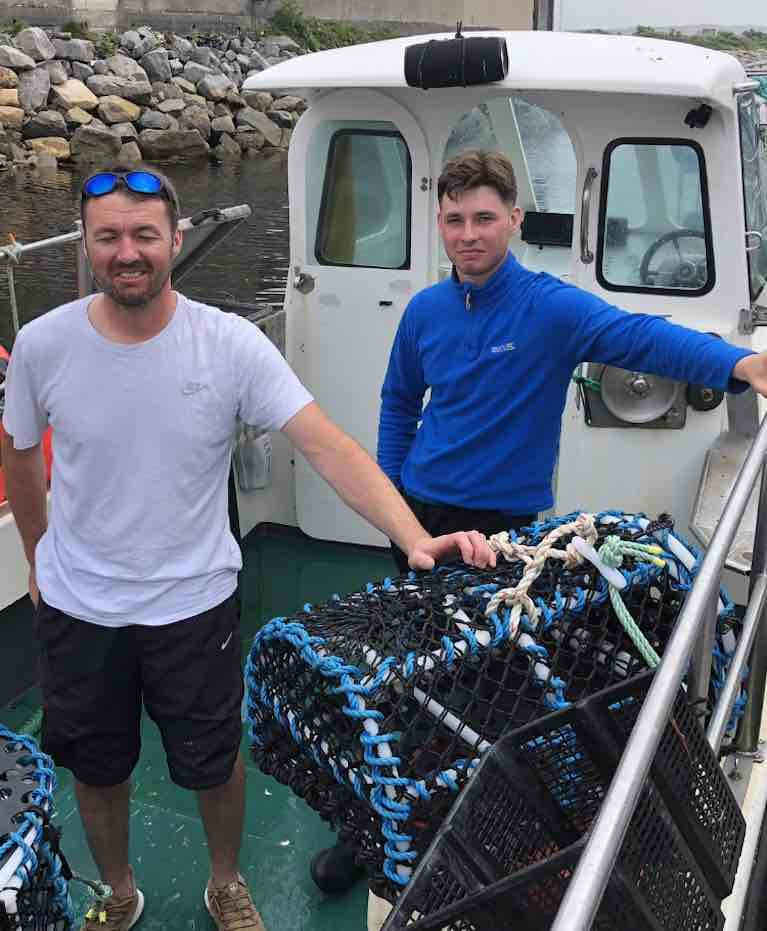It says everything about the announcement that Patrick Oliver of The Claddagh in Galway and his son Morgan are to receive the Afloat.ie National Seamanship Trophy with immediate effect, when we realise that everyone in the country will know exactly what it's for without any further explanation.
Their brilliant rescue on Thursday of two paddle-boarders, who had been blown right across Galway Bay overnight in strong to gale force nor'easters, such that they were 17 sea miles from their start-point in Connemara at Furbo Beach, and south of the Aran Islands, involved genius-level detailed navigational and sea and wind calculations.
 When the Olivers set off on their search, they went directly from Galway to Black Head in northwest Clare, and then southwest leaving Inish Oirr to starboard. Map by Irish Times
When the Olivers set off on their search, they went directly from Galway to Black Head in northwest Clare, and then southwest leaving Inish Oirr to starboard. Map by Irish Times
The last time we made a similar immediate award was jointly with Irish Sailing three years ago in August 2017, when Simon Hoffman of Australia, and Santiago Alegre of Spain, succeeded in a heroic rescue of Cork's Johnny Durcan when he had been completely trapped and was in danger of drowning under his capsized 29er during a major championship in California.
The Hoffman-Alegre award was for bravery, as both sailors had to dive under the 29er's sails and haul Johnny underwater through ropes and other clutter to save his life. But in this instance, as there's no sailing involved, Afloat.ie are going it alone. And as Patrick and Morgan were not themselves in personal danger, the award is for Seamanship.
But what Seamanship it is…..it cannot be said often enough that it has been an instance of completely brilliant seamanship up to the point of genius. The Oliver family are "Claddagh Fishing Royalty", with a flotilla of fishing boats – "too many", they quip - for various purposes. But as Patrick (40) and his son Morgan (18) absorbed the news of the lack of success in the increasingly grim search in Galway Bay on Wednesday night, they set to work ashore, analyzing the way the tides would have been running, and the effect the almost freakish winds – gale force at times – would have affected surface drift.
Then first thing Thursday morning, the pair of them set off in their "little speedboat", a 7 metre Cheetah Class catamaran powered with "two enormous outboards". This is an outfit which they acquired from Kilmore Quay in Wexford, a port where they also know a thing or two about fast lobster and crab fishing boats.
Thus while other craft were combing Galway Bay in an increasingly despairing search pattern, the Oliver team streaked straight down the Bay at 20 knots and then on out of the Bay, only beginning their searching – and in a focused southwesterly direction at that – once they'd got well past Black Head, the imposing northwest headland of County Clare.
 The fastest lobster boat in the west? Patrick and Morgan Oliver's 7-metre Cheetah Class is well able to reach 20 knots. They sourced this special machine in Kilmore Quay in County Wexford. Photo: Pierce Purcell
The fastest lobster boat in the west? Patrick and Morgan Oliver's 7-metre Cheetah Class is well able to reach 20 knots. They sourced this special machine in Kilmore Quay in County Wexford. Photo: Pierce Purcell
With calculations now in overdrive, they were two miles south of Inish Oirr – the most easterly of the Aran Islands – with the unforgiving Cliffs of Moher the nearest bit of the mainland, when Morgan's eagle-eyes spotted the two women paddle-boarders – still with their boards - attached as best they could to a lobster pot marker.
Patrick and Morgan have nothing but praise for the calmness and resilience of Sara Feeney (23) and her cousin Ellen Glynn (17) in coming through their 15 hours-plus nightmare.
It had started with a freakishly warm and calm evening in Furbo, with the sea temperature at the beach - as we reported in Afloat.ie – at 19 degrees centigrade. It was so calm and quiet that the two paddleboarders could make their way gently along the shoreline, chatting with those on the sand.
But then the underlying new gradient wind from the nor'east started to make its catspaws on the water as dusk set in, and with the cooling effect of the evening, the land temperatures fell much more quickly than the warm sea, rapidly accelerating the now combined gradient wind and this growing wind off the land, which in turn gained further power from building thunderstorms.
 Patrick Oliver and his son Morgan, who rescued cousins Ellen Glynn and Sara Feeney off Inis Oirr island, with some of Patrick’s RNLI colleagues on their arrival back at the Galway RNLI Lifeboat Station at Galway Docks. Photograph: Joe O’Shaughnessy
Patrick Oliver and his son Morgan, who rescued cousins Ellen Glynn and Sara Feeney off Inis Oirr island, with some of Patrick’s RNLI colleagues on their arrival back at the Galway RNLI Lifeboat Station at Galway Docks. Photograph: Joe O’Shaughnessy
In an incredibly short time as night fell, the scene was transformed, and the two paddleboarders found themselves being blown out into the lightning-pierced darkness in a near gale. While they both had lifejackets, neither wore a wetsuit, so despite the warm sea, there was a growing risk of hypothermia.
But despair would have been their greatest enemy had they allowed it to take over, so they lashed their paddleboards together using the little painter lines, and kept each other's spirits up by singing and chat, while if one felt sleep coming on, the other let her have a nap while keeping a lookout and a watch on her cousin.
They were in the Atlantic by the time dawn came on, having passed almost exactly midway between Inish Oirr and Clare. But with the light of the new day, they spotted the pot-marker which was to be their saving, and though both painter ropes were already being used to keep the paddleboards together as a sort of life-saving raft, they were able to utilise the side-webbing on the boards to create an atttachment to the pot-marker line - they weren't "clinging on" as initial reports suggested.
And there they waited, in the middle of nowhere with the Atlantic swell for company, until the genius in reading the ways of the sea of Patrick and Morgan Oliver in their little 22ft "lobster speedster" arrived on almost a straight line from Black Head to scoop them up.
There'll have been some shrewd offshore racing campaigners who, when they heard just how accurately this remarkable father-and-son crew calculated precisely where the paddleboarders would be, might understandably have got to thinking that there's the making of an astonishing offshore racing tactical team here.
 Job done. Patrick (who has served with the Galway lifeboat) and Morgan Oliver return with their very efficient rescue vessel to Galway Port, accompanied by the Galway Lifeboat. Photo: Galway RNLI
Job done. Patrick (who has served with the Galway lifeboat) and Morgan Oliver return with their very efficient rescue vessel to Galway Port, accompanied by the Galway Lifeboat. Photo: Galway RNLI
But equally, there'll be HR managers in some high-powered organisations who will be impressed by the cool and calm and resilient way in which Sara and Ellen dealt with their appalling predicament. For sure, they'd made an awful mistake. But anyone who never made mistakes never made anything. It's how you handle the outcome that ultimately matters, so Sara and Ellen are two very special people.
And as for their rescuers, a simple award scarcely does justice to the achievement of Patrick and Morgan Oliver. But it's something we can do to mark the great joy they have brought to Ireland this weekend.





























































